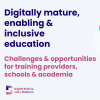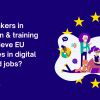Impact of the learning environment and the use of digital tools in everyday life on key skills and competence development (HORIZON-CL2-2025-01-TRANSFO-07 - HORIZON-RIA HORIZON)
Context
This call is part of the Horizon Europe Strategic Plan under the destination “Innovative Research on Social and Economic Transformations”. It aims to deepen understanding on how digital technologies, especially their growing presence in children's lives, affect learning outcomes, well-being, and the educational environment.
Summary
The call addresses the growing integration of digital technologies into children’s daily lives and education. It highlights the importance of promoting not only academic success but also the social, emotional, and mental well-being of students, in line with international and EU policy goals.
Schools are identified as key environments for studying how digital exposure interacts with learning and well-being. The call also acknowledges the challenges posed by digital inequality, which affects equitable access to education, making inclusion a central concern. Ultimately, it stresses the need for reliable, interdisciplinary research to inform policies that safely and effectively harness digital tools to support inclusive and holistic education.
Areas
- Digital Impact on Well-being and Learning: How digital tools affect children's cognitive, emotional, and social well-being, as well as their learning outcomes and academic development.
- Equity and Inclusion: How factors like age, gender, disability, socio-economic background, and digital exclusion influence children’s experiences with digital technologies.
- School Environment and Infrastructure: How physical and digital learning environments support or hinder student well-being and educational outcomes.
- Educational Practices and Interventions: What are effective teaching strategies, school-wide approaches, and digital practices that enhance well-being and learning in primary and secondary education.
- Roles of Stakeholders: Include the perspectives of children, teachers, and school leaders to understand needs, challenges, and opportunities in digitally enriched educational settings.
Target Groups
- Children in primary and/or secondary compulsory education
- Educators
- School Administrations
Eligibility Criteria
- Proposals must include:
- Active participation of children and young people in the research process
- Interdisciplinary and mixed-methods approaches
- Multi-stakeholder involvement, including educators, learners, and policy-makers
- Use of European Research Infrastructures and alignment with FAIR data principles is strongly encouraged
Consortium Composition
- A minimum of three legal entities from three different EU Member States or Associated Countries, with:
- At least one established in an EU Member State
- Eligible entities can include:
- Universities and public research organizations
- SMEs, startups, and tech developers (especially in EdTech or AI)
- Non-profit organizations
- Public authorities and educational institutions
- International organizations, where relevant
- All participants must have a validated Participant Identification Code (PIC)
Funding
- Total Budget: up to EUR 3 400 000
- Number of funded project proposals: 3
Deadline
The deadline to submit applications is set to 16 September 2025 17:00:00 Brussels time.





